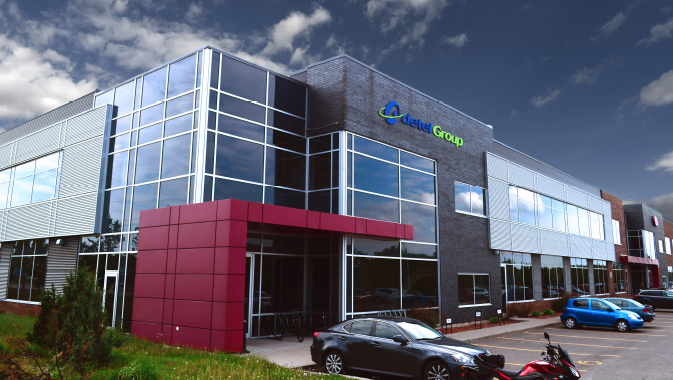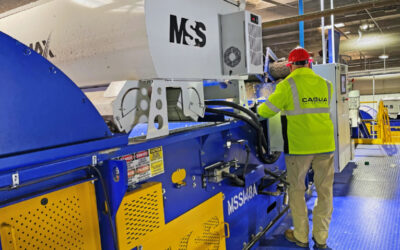Adetel Solution, in Montreal, is part of the International Cendum Adetel Group, which has offices worldwide. The company specializes in custom solutions and innovation and is dedicated to taking on unique engineering challenges and designing quality products that last.
~
Adetel Solution initially got its start as the group Telecite, thirty years ago in Montreal. It designed light-emitting diode (LED) displays, and its first customer was the STCUM (once responsible for commuter trains in Montreal) as it equipped the metro cars with LED displays.
“It was the first system of its kind to be installed in public transport on a vehicle such as a train,” says Centem Adetel Chief Technology Officer Mathieu Ducharme. “And they are still operating in the Montreal Metro today.”
Telecite was eventually acquired by Alstom Group, a French railcar manufacturer, but in 2014, it left to join Adetel Group. And when fifty-one percent of Adetel was bought by Cendum, the two groups merged to become Cendum Adetel.
“We design electronic equipment for the public transport market, and companies that design for that market don’t usually last very long,” says Ducharme. “What distinguishes our Montreal group is that we have a very long history of designing products for the railway and public transport department markets. We’re probably the only one in the world, right now, that has product on board public transport vehicles that have been operating for twenty-five or thirty years.”
The company is known to supply high-quality products. “We have a strong expertise in obsolescence management – being able to design systems that will last for a long time – and being able to supply equipment for the long duration, which is usually very important for the public transport vehicle market,” he says.
“It’s a bit of a paradox,” he says. “Because we design electronic devices, which can be audio equipment for intercom calls or emergency calls between passengers and public transport operators, or it can simply be a visual aid like passenger information displays. If you look at the electronic equipment we are supplying, some of the parts that we’re using come from the generic electronic market – laptops, tablets, television sets. We’re using electronic components that are largely used in consumer markets, but we’re trying to supply that to a very conservative operation field – the public transport. And usually, when a company like a public operator buys a train, it has in mind to be able to operate that train for at least twenty-five years, even forty to forty-five years in some cases. So, we are trying to design electronics that we’ll be able to operate for probably five to ten times longer than the normal consumer electronics products,” he explains.
“There is a new next-generation high-speed train that’s being built by one of our main customers – Alstom – in the northeast corridor of the U.S., that will link Boston and New York, all the way down to Washington,” says Ducharme. “It’s actually the first high-speed train in North America, and we will be supplying all of the passenger comfort electronics on that train. We also provide electronic components on Azur trains – the new latest generation rail metro cars that are being currently delivered for the Montreal Metro,” he adds.
“It is an accomplishment for us, as Montrealers, to be supplying equipment for the Montreal Metro. We would have worked on both generations of train; the old one about thirty years ago and the new one today. We are also supplying the equipment for the Ottawa lightweight vehicles that are currently being built for the new Ottawa Metro Light.
“Our main goal is to be able to design quality products that will last. So, we make sure that the quality of the product that we sell is right for each project,” says Ducharme. “Our staff is very professional, and we are trying to make sure that we can accompany our customer through the duration. We do not sell equipment and then just wait for the next order. Our philosophy is to be able to follow through and then, to maintain these systems over time; it’s part of our quality assessments, and it’s very much linked with what we’re trying to achieve as a team.”
Adetel Solution focuses on maintaining three things. “The first one is to always have a sound financial base in order to invest in innovations,” he says. “This also gives us the possibility to sustain or maintain our products’ solutions for a long time. We are investing a lot to be able to offer the next generation of products and solutions for our customers.
“The second is performance,” says Ducharme. “We always make sure that our solutions are competitive, that they can evolve, that we are very reactive, and that we maintain a very high level of quality. We make sure that our name remains linked to quality products.
“And the third is having internal values, like sustainable development,” he adds. “Maintaining a very strong relationship with our customers is something that we always try to put first.”
Adetel Solution is proud of its many projects and new products. “We have developed a new product line that is called the Neotrans. The new product line is composed of the next generation liquid crystal display (LCD) that we’ve designed for the public transport market. We have also introduced a new public address and intercom solutions which is fully IP and based on standard voice over IP technology.”
One major project that Adetel Solution is presently working on is electric vehicles. “Together, with a number of other partners, we are part of what we call the ‘Projet Mobilisateur Project,’ where different companies come together and work to achieve a global goal,” says Ducharme. “We are part of an ongoing project partially financed by the Quebec government where the goal is to be able to design different classes of heavy electrical vehicles for transport, from class five all the way up to class eight, which will be able to transport goods and passengers,” he says.
“Along with these companies, and in conjunction with the Quebec government electrification process, we are investing part of our internal funds to be able to design a number of electric vehicles,” he says. “We are very excited about designing new products, and we’re aiming to introduce new electric vehicles that are completely built in Canada, onto the market, in the upcoming years.”
He add that, “Our part, at Adetel Solution, is to design the electronic components on board these vehicles while our partners are handling the other aspects of being able to build an electric vehicle. It’s interesting to be able to provide electronic components that not only are part of an important investment in terms of society, but also in terms of all levels of government – municipal, provincial, and federal,” he says.
“When a society invests in public transport, it’s always a very big investment,” says Ducharme. “Not only are we working on something that plays an important role in a big societal project, but we are also designing equipment that is very visible.
“It is a sector/field where there is a lot of innovation, so it changes very rapidly. If you look at the technology that we have used in the past thirty years of our history in Montreal, it’s changed a lot. The [central processing unit] that we use today, in our products, is much more powerful than the strongest server that we used thirty years ago, so it keeps on evolving.
“At Adetel Solution, at our core DNA, we’re electronic product designers,” says Ducharme. “To be able to use devices that change very rapidly in the market and to be able to adapt that to a big investment like big transport vehicles that aren’t usually as responsive or quick to react in the electronic market, is a challenge by itself. We like challenges; we like to innovate, and that’s why we went into the public transport market.”
Some of the company’s electrical devices are produced locally at its Montreal location. “This is not something that you see a lot of these days – a company building electronic devices in Canada,” he says. “And that’s important to us. When it’s very specialized equipment, like public transport, we have the possibility to sustain and maintain a small production of critical electronic devices right here in Canada.”
With approximately ninety employees in Montreal, Adetel Solution is a worldwide group. “If you look at our history, we’ve worked throughout the world,” says Ducharme. “A large portion of the projects we have done have been in Europe, mainly because the railway or public transport in Europe is a little more evolved or developed than it is in North America. That, however, is actually changing. In the past few years, we can see that there has been a lot of investments in public transport in the U.S. and Canada.”
As Adetel Solution continues to grow, it plans to play a more active role in significant projects both in Canada and the U.S. and aims to expand its reach to establish an even stronger foothold in North America.













